Disasters do not discriminate. When floodwaters rise, an earthquake strikes, or food shortages push people to the brink of starvation, those of all religions and none are affected.

“We Christians are considered unimportant,” this woman in Bangladesh told our project partner
Why does Barnabas Aid focus on helping the Christian victims of natural disasters and humanitarian crises?
It is because the victims of disaster are not always treated equally. Members of ethnic and religious minorities can find themselves the last to receive emergency aid. Those who are considered the outsiders – the “others” – are sometimes at the back of the queue when it comes to receiving help.
We know that the Bible teaches that we have a particular duty of care towards our Christian brothers and sisters. “Therefore, as we have opportunity, let us do good to all people, especially to those who belong to the family of believers” (Galatians 6:10).
That duty of care has particular significance in contexts where Christians are a marginalised or despised minority.
Christians excluded from emergency aid
More than five million people were victims of terrifying flash flooding in Bangladesh. Hundreds of thousands were displaced from their homes.
“We Christians are considered unimportant,” one woman told a Barnabas Aid project partner. She had no expectation of receiving help from anywhere else.
Christians make up less than 1% of the Bangladeshi population. They – and other religious minorities – are often discriminated against and are usually among the poorest.
Floods in Borno State, Nigeria, following a dam collapse affected around a million people earlier this month. Among them were thousands of Christians. Many of these had already been forced to flee their homes by Islamist terrorists.
Our project partner has told us that, when it came to emergency help, “the Christian communities have seen nothing. Past experience has shown us that this aid will never get to us.”
Persecution of Christians in Myanmar
One of the most flagrant examples of Christians being excluded from emergency aid emerged in Myanmar, a little over two years ago.
The Association of Southeast Asian Nations (ASEAN) announced it would work with the government of Myanmar to provide aid to those suffering a humanitarian disaster owing to, at that time, around 18 months of civil war.
Yet the people of Christian-majority Chin State were excluded from the distribution by Myanmar’s military government. “It’s like the people of Chin State – the most vulnerable people – have had their rights ignored,” said the chairman of Interim Chin National Consultative Council.

Barnabas Aid provided rice, chickpeas and cooking oil to 350 familes in a Christian-majority region of Myanmar in June-September 2024
The example of Chin State is instructive, because even before the military coup in February 2021 and the civil war that followed, it was one of the least developed and most disadvantaged areas of the country.
Christians in places like Myanmar, Bangladesh and others are very often the most impoverished, the most needy, even before they are excluded from the distribution of aid.
Depending on God: Faith in a time of crisis
Our sister in Bangladesh – who spoke of Christians being “unimportant” – adds, “We can only depend on God in our crisis.”
Believers in contexts of marginalisation and persecution are led to depend on the Lord more fully than perhaps those of us who live in lands of relative peace and plenty.
We should also remember that God works through His Church – His people.
We have a responsibility to provide out of the resources that the Lord has allocated to us. We have a responsibility to see that the faithful expectation of our Christian family is not in vain.
For this reason Barnabas Aid continues the mission of providing for “the family of believers” in times of crisis and disaster.

